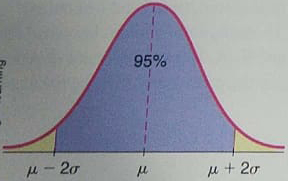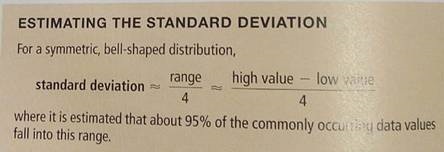
Understanding Basic Statistics 6th Edition by Charles Henry Brase,Corrinne Pellillo Brase
Edition 6ISBN: 978-1111827021
Understanding Basic Statistics 6th Edition by Charles Henry Brase,Corrinne Pellillo Brase
Edition 6ISBN: 978-1111827021 Exercise 167
Expand Your Knowledge: Estimating the Standard Deviation Consumer Reports gave information about the ages at which various household products are replaced. For example, color TVs are replaced at an average age of = 8 years after purchase, and the (95% of data) range was from 5 to 11 years. Thus, the range was 11 5 = 6 years. Let x be the age (in years) at which a color TV is replaced. Assume that x has a distribution that is approximately normal,
(a) The empirical rule (Section 7.1) indicates that for a symmetrical and bell-shaped distribution, approximately 95% of the data lies within two standard deviations of the mean. Therefore, a 95% range of data values extending from - 2 to + 2 is often used for "commonly occurring" data values. Note that the interval from -2 to + 2 is 4 in length. This leads to a "rule of thumb" for estimating the standard deviation from a 95% range of data values.


Use this "rule of thumb" to approximate the standard deviation of x values, where x is the age (in years) at which a color TV is replaced.
(b) What is the probability that someone will keep a color TV more than 5 years before replacement
(c) What is the probability that someone will keep a color TV fewer than 10 years before replacement
(d) Inverse Normal Distribution Assume that the average life of a color TV is 8 years with a standard deviation of 1.5 years before it breaks. Suppose that a company guarantees color TVs and will replace a TV that breaks while under guarantee with a new one. However, the guarantee. For how long should the guarantee be made (rounded to the nearest tenth of a year)
(a) The empirical rule (Section 7.1) indicates that for a symmetrical and bell-shaped distribution, approximately 95% of the data lies within two standard deviations of the mean. Therefore, a 95% range of data values extending from - 2 to + 2 is often used for "commonly occurring" data values. Note that the interval from -2 to + 2 is 4 in length. This leads to a "rule of thumb" for estimating the standard deviation from a 95% range of data values.


Use this "rule of thumb" to approximate the standard deviation of x values, where x is the age (in years) at which a color TV is replaced.
(b) What is the probability that someone will keep a color TV more than 5 years before replacement
(c) What is the probability that someone will keep a color TV fewer than 10 years before replacement
(d) Inverse Normal Distribution Assume that the average life of a color TV is 8 years with a standard deviation of 1.5 years before it breaks. Suppose that a company guarantees color TVs and will replace a TV that breaks while under guarantee with a new one. However, the guarantee. For how long should the guarantee be made (rounded to the nearest tenth of a year)
Explanation
Given that,
Let x be the age at which a ...
Understanding Basic Statistics 6th Edition by Charles Henry Brase,Corrinne Pellillo Brase
Why don’t you like this exercise?
Other Minimum 8 character and maximum 255 character
Character 255



